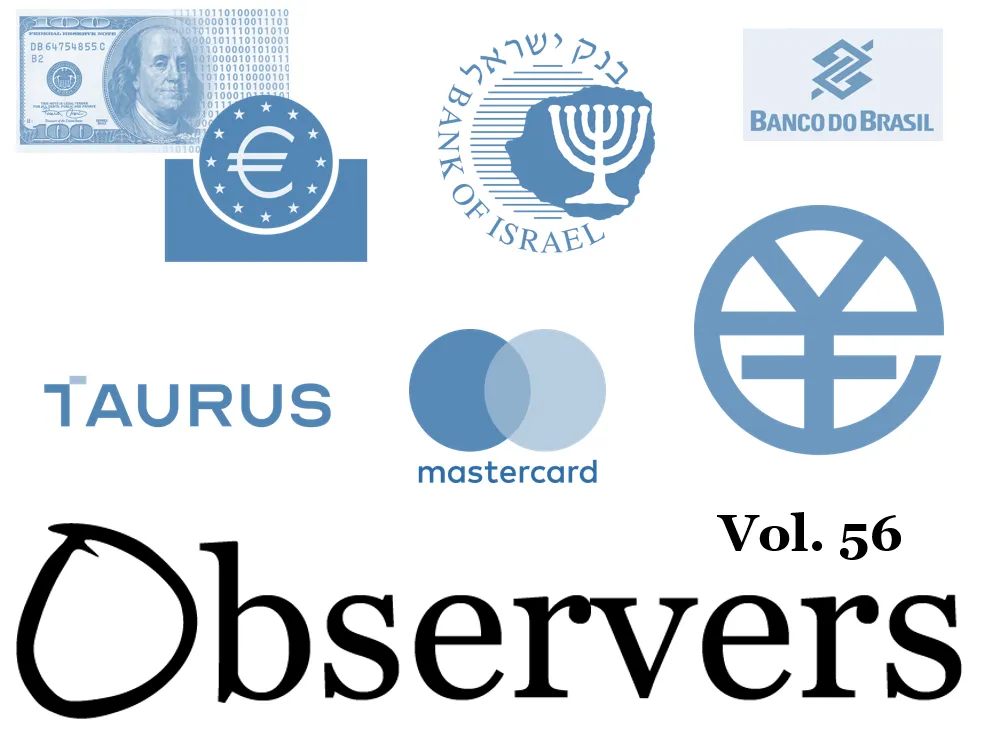Banking and CBDC Roundup: 19/03/2025
0
1
Europe Accelerates Digital Euro Plans Responding To US Position on Digital Currencies

In a European Central Bank press conference on March 6, it was revealed that the ECB has set an Oct 2025 deadline for the launch of the Digital Euro. The revelation followed a question about how the ECB planned to push ahead with the digital euro in light of the US CBDC ban.
“The deadline for us is going to be October 2025, and we are getting ready for that deadline,” said ECB President Christine Lagarde. However, Lagarde also mentioned that they will not be able to move the digital euro forward unless the other parties complete the legislative process. According to a recent report, European lawmakers voiced their concerns about the digital euro plan after the breakdown of the Target (T2) payment system in February 2025.
In response to these concerns, the ECB spokesperson said, “The recent outage doesn’t undermine the robustness of the digital euro infrastructure, which is being designed to guarantee that payments continue to function smoothly for users, even when technical issues arise.”
In the Press Conference following the Eurogroup meeting on 10 March in Brussels, participants spoke about the importance of the digital euro and how the US’s favorable attitude towards dollar stablecoins might increase the urgency of the digital euro.
Pierre Gramegna, Managing Director of the European Stability Mechanism, expressed concerns that dollar-based stablecoins and payment solutions would “affect the Euro area’s monetary sovereignty and financial stability.” The concern has driven the ESM to support the urgency of the digital euro, which “is today more necessary than ever.”
Eurogroup also found the fast political and technological evolvement of the crypto market. Paschal Dohonoe, the Irish Finance Minister and President of the Eurogroup said he believes “the digital euro is critical to staying ahead of the curve in this area.”
Currently, the digital euro is in a two-year preparation phase, which was launched in November 2023. There is no final decision on whether the European CBDC will eventually be put in circulation. How it will fit into the market remains one of the big questions.
A recent study by the BearingPoint consultancy released in February, showed differences in the willingness to use a digital euro in different countries. Across all countries, on average, one-third of respondents would like to use the digital euro, and one-fifth are ready to use it multiple times a week. However, countries with lower cash usage, like Sweden, Denmark, and Finland, are less likely to use the digital euro regularly. In fact, less than 30% of respondents in these countries said they would use the digital euro/CBDC at all.
The most popular utility for a digital euro is online shopping, with an average of 36%, followed by in-store shopping (28%). The top requirements for use were free-of-charge (43%) and acceptance everywhere 24/7 (37%), which remains the same compared to the previous year.
Another notable finding is the level of trust. The study showed that most respondents (42%) trust commercial banks to hold their transaction data, which is still far above the ECB/Central Bank (13%), Payment companies (8%), and tech companies (5%). Trust in banks is ten times higher than tech companies, suggesting that legislators should consider how the data would be handled for the digital euro CBDC.
Now, with the ECB’s effort to accelerate the process and with support from other organizations, a decision on launching the digital euro will likely be no later than anticipated.
e-CNY Got Included in China’s Latest Finance Guidelines
The General Office of the State Council of the People's Republic of China released guidelines for the future development of the financial sector in China to 2027. The implementation of e-CNY was revealed in the Digital Finance focus, which shows China's determination to implement a CBDC successfully. It’s noteworthy that this was the first time China mentioned e-CNY in its relevant guidelines.
These latest guidelines aim to develop “five main fields” in China’s finance sector, including Fintech, Green Finance, Inclusive Finance, Pension Finance, and Digital Finance. Earlier, the National Financial Regulatory Administration and the China Securities Regulatory Commission released just two sets of guidelines in May 2024 and February 2025 for the banking, insurance sector, and capital markets, respectively.
In the new use cases of China’s CBDC, sources report that China Universal Asset Management (CUAM) started supporting the payment of e-CNY for its publicly offered fund in March 2025, which is the first business practice of e-CNY for a publicly offered fund payment.
This project was completed through a collaboration between CUAM and the Bank of Communications. Users will be able to purchase and redeem funds with their e-CNY wallet on the CUAM-made “CashPlus” app.
The adoption of e-CNY continues to grow. As of March 11th this year, the number of e-CNY wallets reached 800 million, with over 1.02 billion CNY transactions.
CBDC Developments Around The World
Iraq Plans CBDC as an Alternative to Banknotes
The Iraqi government announced in March 2025 that the Central Bank of Iraq planned to issue a CBDC as an alternative to banknotes. The authorities seek to reduce costs associated with cash printing and distribution, and enhance transparency and control over financial flows.
Mazhar Mohammed Saleh, the prime minister's financial advisor, pointed out that the trend of issuing a digital currency "represents a qualitative leap in the national digital payments system."
Bank of Ghana CBDC Launch Expected in 2025
Meanwhile, The Bank of Ghana expected to launch its retail CBDC in 2025, as seen in a report by OMFIF. Kwame Oppong, head of FinTech and innovation, said it would deliver the offline payments function.
South Korea 100,000 User CBDC Pilot
It's also been reported that the Bank of Korea will launch a three-month CBDC pilot involving 100,000 users and seven banks no later than April this year. These users can make payments via the QR code in their digital wallets. The announcement and preparations for this pilot program were initiated by the Korean regulator in June 2024.
Cambodia's Bakong CBDC Growth
The National Bank of Cambodia disclosed the continued growth of its DLT payment system, Bakong, in its annual report.

Payment volumes of over $104 billion during 2024 represented 330% of the country's GDP. The number of Bakong wallets is around 30 million.
Cambodia's Bakong is one of the first CBDC projects running. Developed by Soramitsu, it runs on the Hyperledger Iroha blockchain.
Brazil DREX Wholesale CBDC Privacy Challenge
Banco Central do Brasil (BIB) published a technical report on the first phase of the DREX wholesale CBDC, which included tests of use cases related to tokenized deposits. In the first phase, the BIB found a privacy challenge that required more monitoring than anticipated. The second phase of DREX has been running since November 2024, focusing on trade finance solutions.
Bank of Israel Design Document and Study on Public Attitudes
The Bank of Israel published a design document for the digital shekel system, inviting feedback from the public regarding some key features. The digital shekel is expected to be available to the entire public, support offline payments, and serve as a basis for advanced payment use cases.
Alongside the design document, the Bank of Israel also published a study on the public's attitudes towards the digital shekel. The study found that 34% of the public showed a very high level of interest in usage, while more than half of the respondents showed a high interest. This finding indicates a high potential for the adoption of the digital shekel.
Tokenization News
Calastone Estimates a Massive Saving with Tokenizations for Asset Managers
The latest survey conducted by Calastone estimated that tokenization would become a major part of the strategy for asset managers, and it expects a saving of $135.3 billion per year in asset management.
The estimate of savings is calculated from the expected cost inflation and the potential saving of 23% in operating costs.

Besides the savings for the industry, Calastone also projects increased revenue of $1.4-$4.2 million per fund and a total P&L improvement of $3.1-$7.9 million.
Respondents felt positive that tokenization would make a difference, though implementation challenges exist, including technical skills requirements, limitations of legacy systems, and finding partners and technology providers.
Ondo's Tokenized Fund Integrated with Mastercard Multi-Token Network
RWA tokenization firm Ondo Finance has integrated its OUSG money market fund with Multi-Token Network (MTN) developed by Mastercard. OUSG MMF is a short-term U.S. treasuries fund with 24/7 stablecoin mints and redemptions. As a result of integration, the OUSG owners can redeem their funds and get paid out via a bank using MTN.
Launched in 2023, Mastercard MTN enables settlement for tokenized deposits and assets through a unified platform. In November 2024, it was integrated with Kinexys Digital Payments, a digital ledger platform developed and owned by J.P. Morgan. Under this partnership, Ondo Finance became the first provider of tokenized RWAs for Mastercard MTN.
Taurus Releases Token Standard for Permissionless Blockchains
Taurus has published an open-source token standard for financial instrument tokenization in collaboration with the Aztec Foundation. The standard enables financial institutions to tokenize on permissionless blockchains securely and privately.
Taurus's standard implemented the CMTAT security token, a framework for smart contracts to design tokens suitable for financial instruments, in a private version. It's designed to grant issuers control over access to view issued assets on permissionless blockchains, ensuring built-in and automated compliance requirements.
ECB expanded the initiative of DLT transactions
The Governing Council of the European Central Bank (ECB) announced an initiative expansion to settle transactions recorded on distributed ledger technology (DLT) in central bank money. It aims to establish an integrated European market for digital assets, in line with the Governing Council’s call for promoting a digital capital markets union.
Eurosystem will take a two-track approach to the initiative. The first is developing and implementing a platform for central banks’ settlement through an interoperability link with TARGET Services. Timings will be announced in the future. The second track is building a long-term and integrated solution that includes international operations.
“This is an important contribution to enhancing European financial market efficiency through innovation,” said Piero Cipollone, a member of the ECB’s Executive board.“Our approach will pay due attention to the Eurosystem’s goal of achieving a more harmonized and integrated European financial ecosystem.”
The initiative will build on previous exploratory work on DLT settlement solutions by the Eurosystem. The exploratory work involved 60 firms, 4 central banks, and over 50 trials and experiments.
0
1
 Manage all your crypto, NFT and DeFi from one place
Manage all your crypto, NFT and DeFi from one placeSecurely connect the portfolio you’re using to start.



